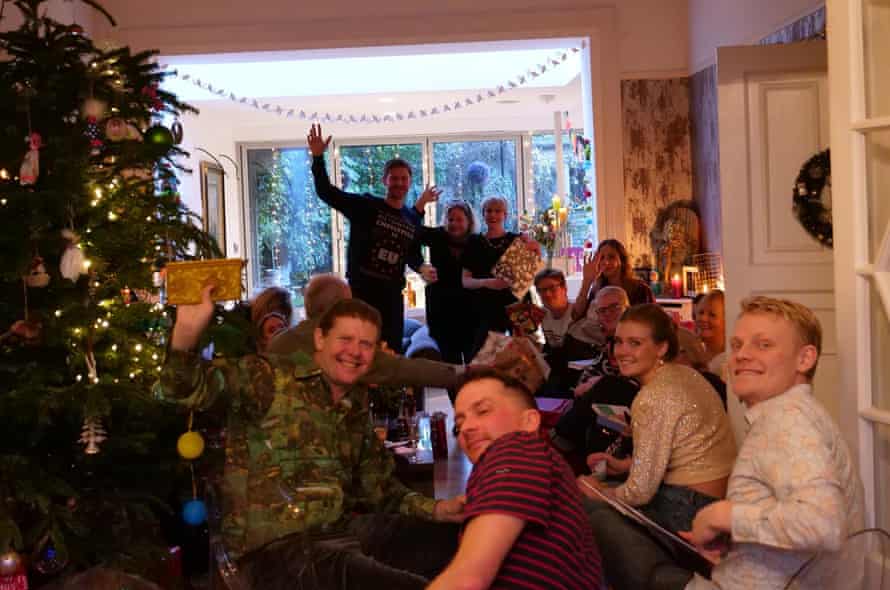We were halfway through the annual game of pass-the-orange-under-the-chin when I realised that Christmas was going to be OK. No, not just OK, better.
My Dundonian mother is pretty competitive when it comes to our traditional Christmas games – no one flips a kipper further or faster. Yet there she was, standing between Mohammed and Ayman and taking significantly longer than usual to retrieve the orange from beneath the chin of one of our Syrian guests before passing it securely to the next.
“Are you all right there, Ma?”
“I’m fine, thank you. You worry about your own team.”
My team managed to transport the orange up and down our line of 12 people without the use of hands and won. My mother didn’t seem that bothered.
The gathering of clans for our family Christmas is never a small affair. Health and travel arrangements allowing, we usually number 20-plus Haningtons and Scotts, plus in-laws. In 2017 our numbers were swollen still further, thanks to the addition of Mohammed and Ayman and a couple of their friends.

I had been anxious about Christmas. We are not a particularly religious family, but certain things are non-negotiable. We always have to watch the four Christmas classics: Scrooged; It’s a Wonderful Life; The Grinch; and Home Alone 2. We all write a letter to Father Christmas, regardless of whether or not we believe in him. And we all go to midnight mass and sing our lungs out, regardless of … see previous.
I worried about whether our guests, both of whom are Muslim, would fit in. I worried about whether they would want to.
We had been hosting refugees like Mohammed and Ayman for just shy of a year. We decided to do it because it was something we could do. We live in a big house in a part of London with a park and woodlands, pubs and a decent high street. In short, we are very lucky, and once it became clear that both our children were heading to Glasgow for study and work, it seemed like time to share some of that good luck with people who had enjoyed very little.
My wife took the lead, contacting Refugees at Home, a charity that essentially provides a matchmaking service, connecting refugees who need temporary accommodation with families or individuals who are willing to host them. The minimum requirement is that you can offer a room in your house and a shelf in the fridge where your guest can store their food. In practice, of course, you end up sharing much more than that. The proof of that came in many forms that Christmas, including a pudding-shaped starter made entirely of rice-stuffed vine leaves.
Usually, everyone takes responsibility for bringing some of the food for our annual get-together. Snacks, starters, multiple main courses, cheeses, booze, puddings and indigestion tablets – everyone brings something. This year, Mohammed and Ayman suggested we do it differently. If we all donated a few quid, they would ask their friend Mo Rahimeh, the man behind a pop-up restaurant called Mo’s Eggs, to help them give the whole occasion a Syrian flavour.
Mo can make an egg taste better than any egg has a right to taste, but with Ayman and Mohammed’s help he went further. Freshly baked flatbread with homemade hummus and a smoky baba ganoush. Syrian rice with roast chicken, eggs cooked in half a dozen different ways including the “jungle eggs” that he had created when he was in the camp outside Calais. Plus, of course, the stuffed vine-leaf creation, which looked more like an artwork than an entrée.
Bread was broken and stories were told. The young Syrians talked openly to interested family members about the ordeals they had gone through in order to reach the UK. I had spoken to them, and to other refugees we had met, about their journeys across Africa and Europe as part of the research for a book I was writing and had come to realise that, if anything, we underestimate the horror.
In between the stories, everyone took turns on Spotify, and the result was an interesting mash-up of Motown, Fairouz, Slade, Sabah Fakhri and Bob Dylan’s Christmas album.
The day and night-long celebration culminated with some more games, guitars and harmonica and jokes, some of which were easier to translate than others. Someone read an extract from Dickens’ Christmas Carol, someone else read some Dylan Thomas. Finally, Ayman stood and recited The Damascene Poem by Nizar Qabbani. He spoke in Arabic and then in English.
“I am a Damascene
If you dissect me into halves
You will have but grapes and apples
Falling in your path.”
It was a hard act to follow and, wisely, no one tried. Better to sit and acknowledge the many gifts these young guys from Damascus had brought us.
Peter Hanington’s political thriller A Single Source, set in the heart of the Arab spring, is published by Two Roads/John Murray
from Lifestyle | The Guardian https://ift.tt/3apl8vA
via IFTTT

comment 0 Comment
more_vert